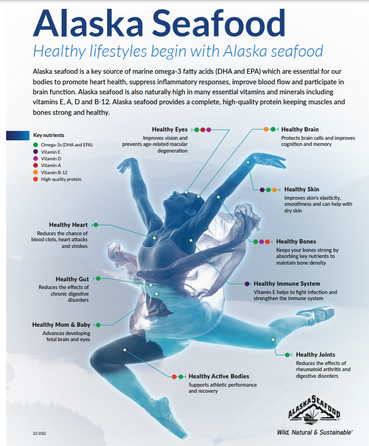
Good nutrition is really important to supporting a strong immune system. A balanced diet that includes fatty fish is a great start. Having a strong immune system is bolstered by a good diet and seafood is a key component. In fact, data from a study conducted with more than 420,000 people done by a partnership with the National Institute of Health and the AARP shows that eating seafood reduced respiratory deaths by 20 percent. And in addition, higher fish and omega-3 fatty acids consumption are associated with lower total mortality. Regardless of where you are in life, eating seafood can benefit your immune system. In particular, seafood has been shown to offer protection to a number of inflammatory ailments.
For example, early in life, eating seafood high in omega-3 fatty acids may promote immune system maturation in infancy and can lessen the symptoms of childhood allergies.
As we age, research also suggests that increased omega-3 consumption may ease the symptoms of some inflammatory conditions, such as rheumatoid arthritis, asthma, and some allergies and digestive disorders.
Key nutrients associated with immunity in wild Alaska seafood include omega-3 fatty acids, zinc, selenium, vitamin D, vitamin A, vitamin B, iron, and others.
The Omega-3s in seafood have long been known for their benefits to heart and brain function, but they also are known for their anti-inflammatory properties. For example, omega-3 fatty acids generate pro-solving lipid mediators. Pro-solving lipid mediators are responsible for regulating immune response.
Zinc plays a role in host defenses against infections. Deficiency results in suppressed immune function. A typical western diet does not include a sufficient amount of zinc.
Selenium maintains and improves immune function. It provides powerful antioxidant protection for the body. As an antioxidant, selenium helps reduce oxidative stress and minimize damaging free radicals in our bodies. Some of the best natural sources of selenium are halibut, rockfish, and salmon. A 3-ounce serving of rockfish has 65 mcg or 118% of the recommended daily value of selenium!
Vitamin D plays an important role in our immune response to infection by triggering production of a peptide that engages in antimicrobial activity against intracellular bacteria. In other words, if you are low in vitamin D, your body is more susceptible to infection. Being low vitamin D is common in the United States—we still don’t eat enough seafood. Beyond sunlight, seafood is one of the few natural sources for vitamin D. A 6-ounce portion of our coho salmon or our sablefish both have 90% of the recommended daily value of vitamin D. Other salmon and halibut also have significant amounts of vitamin D.
Vitamin A is responsible for enhancing the epithelial tissue resist invasion by pathogenic bacteria. Foods like carrots are known to be excellent sources of vitamin A. Another good source is our rockfish.
Vitamin B regulates inflammation and promotes red and white blood cell development which helps keep oxygen flowing and fighting disease. Here, rockfish and lingcod are good options, as well as crab.
Magnesium helps regulate immune cell development. Fish like salmon and halibut contain magnesium.
With all of seafood’s nutrients, sometimes we forget how important protein is. And all seafood is a good source of high-quality, lean protein. The protein that seafood contains includes all essential amino acids for health, making it a complete protein.
Potassium and calcium are also in seafood and are essential for staying healthy. In particular, salmon, halibut, and tuna are good options.
There is no one food source on its own that will keep your immune system working, but seafood is a really good option that covers a lot of bases. Eating two servings of seafood per week is a great place to start. Another benefit of seafood is that it pairs well with leafy green vegetables, which—guess what—are also highly associated with healthy immune systems.
Graphic and sources courtesy of Alaska Seafood. In addition, sources from the Seafood Nutrition Partnership.



